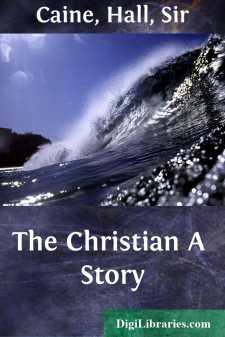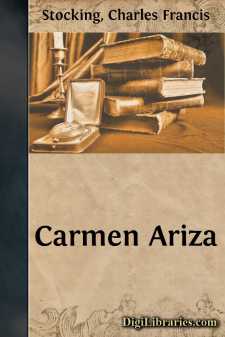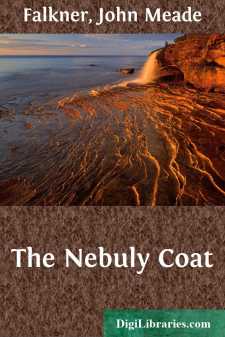Fiction
- Action & Adventure 180
- Biographical 15
- Christian 59
- Classics 6965
- Coming of Age 5
- Contemporary Women 3
- Erotica 8
- Espionage/Intrigue 12
- Fairy Tales, Folklore & Mythology 236
- Family Life 169
- Fantasy 117
- Gay 1
- General 596
- Ghost 32
- Historical 808
- Horror 43
- Humorous 160
- Jewish 25
- Legal 4
- Medical 22
- Mystery & Detective 315
- Political 49
- Psychological 41
- Religious
- Romance 159
- Sagas 11
- Science Fiction 730
- Sea Stories 113
- Short Stories (single author) 537
- Sports 10
- Suspense 1
- Technological 8
- Thrillers 2
- Urban Life 31
- Visionary & Metaphysical 1
- War & Military 173
- Westerns 199
Religious Books
Sort by:
CHAPTER I It was about six o'clock of a winter's morning. In the eastern sky faint streaks of grey had come and were succeeded by flashes of red, crimson-cloaked heralds of the coming day. It had snowed the day before, but a warm wind had sprung up during the night, and the snow had partially melted, leaving the earth showing through in ugly patches of yellow clay and sooty mud. Half...
more...
CHAPTER I The crowd gave way and the car glided smoothly up to the curb at the canopied entrance to the church. The blackness of the wet November night was upon the street. It had rained at intervals all day. The pavements shone wetly like new paint in the glimmer of the street lights, and rude shadows gloomed in every cranny of the great stone building. Betty, alone in the midst of her bridal finery,...
more...
by:
Hall Caine
I. On the morning of the 9th of May, 18—, three persons important to this story stood among the passengers on the deck of the Isle of Man steamship Tynwald as she lay by the pier at Douglas getting up steam for the passage to Liverpool. One of these was an old clergyman of seventy, with a sweet, mellow, childlike face; another was a young man of thirty, also a clergyman; the third was a girl of...
more...
CHAPTER 1 The tropical sun mounted the rim of the golden Caribbean, quivered for a moment like a fledgeling preening its wings for flight, then launched forth boldly into the vault of heaven, shattering the lowering vapors of night into a myriad fleecy clouds of every form and color, and driving them before it into the abysmal blue above. Leaping the sullen walls of old Cartagena, the morning beams...
more...
by:
Harold Frederic
CHAPTER I No such throng had ever before been seen in the building during all its eight years of existence. People were wedged together most uncomfortably upon the seats; they stood packed in the aisles and overflowed the galleries; at the back, in the shadows underneath these galleries, they formed broad, dense masses about the doors, through which it would be hopeless to attempt a passage. The light,...
more...
THE AUTHOR TO THE READER A la sueur de ton visaige,Tu gagnerais ta pauvre vie.Après long travail et usaige,Voicy la mort qui te convie.* THIS quaint old French verse, written under one of Holbein's pictures, is profoundly melancholy. The engraving represents a laborer driving his plow through the middle of a field. Beyond him stretches a vast horizon, dotted with wretched huts; the sun is sinking...
more...
by:
William Godwin
The following performance, as the title imports, was originally composed in the Welch language. Its style is elegant and pure. And if the translator has not, as many of his brethren have done, suffered the spirit of the original totally to evaporate, he apprehends it will be found to contain much novelty of conception, much classical taste, and great spirit and beauty in the execution. It appears under...
more...
IA la sueur de ton visaigeTu gagnerois ta pauvre vie,Après long travail et usaige,Voicy lamortqui te convie. The quatrain in old French written below one of Holbein's pictures is profoundly sad in its simplicity. The engraving represents a ploughman driving his plough through a field. A vast expanse of country stretches away in the distance, with some poor cabins here and there; the sun is...
more...
Prologue. Sir George Farquhar, Baronet, builder of railway-stations, and institutes, and churches, author, antiquarian, and senior partner of Farquhar and Farquhar, leant back in his office chair and turned it sideways to give more point to his remarks. Before him stood an understudy, whom he was sending to superintend the restoration work at Cullerne Minster. “Well, good-bye, Westray; keep your eyes...
more...
by:
Thomas Hardy
PREFACE This story of the Mellstock Quire and its old established west-gallery musicians, with some supplementary descriptions of similar officials in Two on a Tower, A Few Crusted Characters, and other places, is intended to be a fairly true picture, at first hand, of the personages, ways, and customs which were common among such orchestral bodies in the villages of fifty or sixty years ago. One is...
more...











